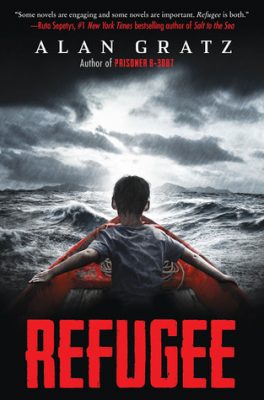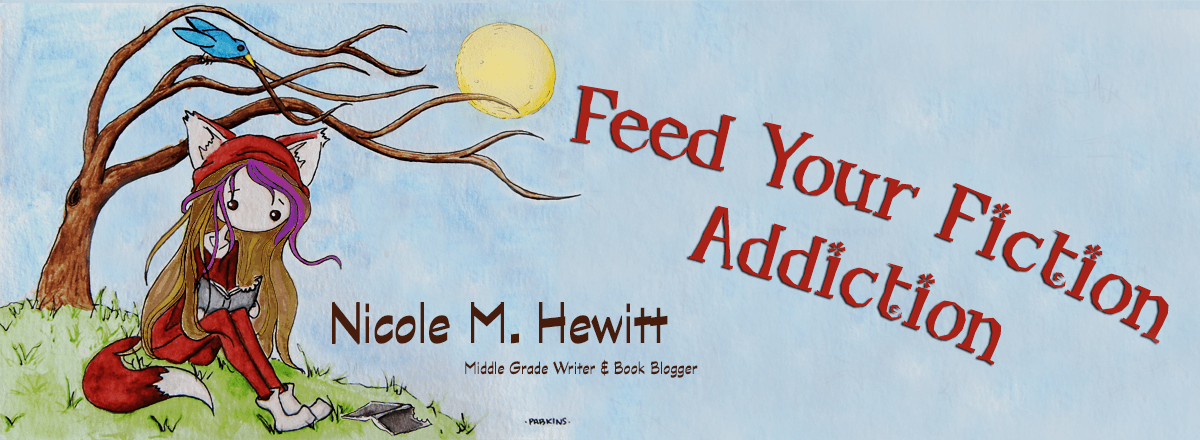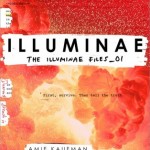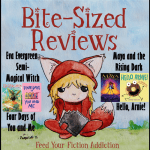
(No actual dueling—or even arm-twisting—was involved. Don’t worry, this is a dual review, not a duel review. Sorry if you’re disappointed.)
AJ @ Read All the Things was the latest winner of my Monthly Wrap-Up Round-Up “Make Me Read It” giveaway, and she chose to make me read Refugee by Alan Gratz. I was very happy with the selection since I’d been meaning to read this one for quite a while. I read the book and then bought a copy for AJ (since I wanted to hold onto mine), and we did a dual review together.
Read on to see what we thought of the book…
 Refugee by Alan Gratz
Refugee by Alan Gratz Published by Scholastic on July 25, 2017
Genres: Middle Grade, Historical Fiction
Pages: 352
Source: ALA
My content rating: MG (Some violence and death)
My rating:

Three different kids.
One mission in common: ESCAPE.
Josef is a Jewish boy in 1930s Nazi Germany. With the threat of concentration camps looming, he and his family board a ship bound for the other side of the world…
Isabel is a Cuban girl in 1994. With riots and unrest plaguing her country, she and her family set out on a raft, hoping to find safety and freedom in America…
Mahmoud is a Syrian boy in 2015. With his homeland torn apart by violence and destruction, he and his family begin a long trek toward Europe…
All three young people will go on harrowing journeys in search of refuge. All will face unimaginable dangers–from drownings to bombings to betrayals. But for each of them, there is always the hope of tomorrow. And although Josef, Isabel, and Mahmoud are separated by continents and decades, surprising connections will tie their stories together in the end.
![]()
AJ and I both loved this book! I will say right up front that the book is sad. That shouldn’t be a surprise, considering the subject matter, but I mention it as a trigger warning, in case you have kids like my daughter, who has a hard time processing sad books. But the book is a great story and a fantastic tool for building empathy in our kids.
What Fed Our Addiction:
AJ SAYS:
The action. I should have guessed from the cover that the book would be harrowing and fast-paced. I love that the action started on page 1. The pacing works well for a middle grade book because there’s always something new happening. The characters keep finding themselves in deeper trouble. Refugee kept me awake most of the night because I had to know which characters were going to survive. I didn’t want to stop reading.
NICOLE SAYS:
I totally agree. When the book starts, all three of the main characters are in immediate danger of some kind or another, and that keeps building throughout the book. There really aren’t any points in this book where you’re bored. Even when one character’s story has slowed down momentarily, inevitably, one of the others has picked up.
AJ SAYS:
The structure. The book has three main characters who live at different points in history. At first I wasn’t sure how I felt about this because the chapters are short, and there’s a lot of bouncing around in time. As the book went on, I started to enjoy it. I liked all three characters equally and wasn’t bored with any of their storylines.
NICOLE SAYS:
I actually really liked this structure right from the beginning, surprisingly. I wanted to get to know each MC and I liked getting little pieces of each of their stories as the book went along. It could have been confusing, especially since the timelines didn’t necessarily line up (one month in one storyline might have only equaled a day in another), but Gratz really made it work. I was never confused.
AJ SAYS:
Anybody can become a refugee. I like that the characters are trying to get to one another’s countries. In the 2015 timeline, Mahmoud is trying to get out of Syria and into Germany. In the 1930s timeline, Josef is trying to get out of Germany and into Cuba. In the 1990s timeline, Isabel is trying to get out of Cuba and into the US. The story shows that anybody can become a refugee. Just because a country is safe now doesn’t mean that it will always be safe. On a less-depressing note, the book also shows that countries can recover from wars and bad leadership. Germany used to have its own refugee crisis, but now it’s a place that refugees want to go to find safety.
NICOLE SAYS:
Yes! This was fascinating to me. I agree that this was a perfect way to show how countries change over time, and it really puts things in perspective. Could you imagine a day in the distant future where people in the US are fleeing to Syria? It’s a crazy thought, right? I don’t know that I think that will ever happen, but this proves that you can’t know for sure what the future might hold.
AJ SAYS:
Families. The child characters are all fleeing from their homes with their families. I always like seeing families in middle grade fiction. Young teens are still very dependent on their parents/grandparents, so it makes sense that the adults would play a big role in the story.
NICOLE SAYS:
So true. In this story, it wouldn’t make sense any other way. And the family bonds were present in each of the three stories, but they were very different for each family, which I loved. We got a sense of all three eras and cultures through this.
AJ SAYS:
How the plotlines come together at the end. I had a feeling that the three characters’ stories would come together at the end, but I didn’t know how that would happen. I don’t want to give away spoilers, but I was satisfied with the way that the author pulls everything together at the end.
NICOLE SAYS:
I loved this too. The ending was beautiful and bittersweet and left us with a feeling that we’d come full circle in a lot of ways.
AJ SAYS:
Charity. A portion of the proceeds from the sale of this book go to UNICEF, a charity the helps refugee children. If you buy the book, your money is going to a good cause.
NICOLE SAYS:
I had actually forgotten about that. I’m glad you mentioned it!
What Left Us Hungry for More:
AJ SAYS:
Too educational? This feels like a school book. I can see a lot of teachers using it as assigned reading. There are a few points in the story—especially early on—where it’s very obvious that the author is giving the reader a history lesson. I would have hated that as a kid. Overtly educational books made me rebellious. I refused to read them.
NICOLE SAYS:
Ha! I didn’t think it was too educational, but I’m a teacher, so I guess I just might have been too excited to see those educational aspects and not thought beyond that. I did think that I want to get this book into the hands of lots of kids so they can learn compassion for the world.
AJ SAYS:
More character development. Since there’s so much focus on action, we don’t learn much about who these characters were before they became refugees. They would have seemed more real to me if I knew more about them.
NICOLE SAYS:
I agree with this. I also wished that the voices of the three MCs had been a little more differentiated. It was obvious who they were based on circumstances and the action, so I wasn’t confused, but I think Gratz could have worked a little harder to give them distinct voices.
So, as you can see, we both highly recommend this one. This is the type of book that grips you right from the start and leaves you feeling just a little dazed when you’re done. I guarantee you won’t stop thinking about it right when you put the book down.
***Disclosure: Nicole received this book from the publisher via ALA Annual 2017 in exchange for an honest review (and AJ got it from Nicole!). No other compensation was given and all opinions are our own.***
About the Author

Alan Gratz is the New York Times bestselling author of a number of novels for young readers. His first novel, Samurai Shortstop, was named one of the ALA’s 2007 Top Ten Best Books for Young Adults. His second novel, Something Rotten, was a 2008 ALA Quick Pick for Young Adult Readers, and was followed by a sequel, Something Wicked, in October 2008. His first middle grade novel, The Brooklyn Nine, was one of the ALA’s Top Ten Sports Books for Youth and Top Ten Historical Books for Youth, and his middle grade Holocaust novel Prisoner B-3087 was one of YALSA’s 2014 Best Fiction for Young Readers and has won eight state awards. He is also the author of the YA thriller Code of Honor, a YALSA 2016 Quick Pick for Reluctant Readers, the middle grade historical thriller Projekt 1065, and the League of Seven trilogy. His latest books are Refugee and Ban This Book.
Alan’s short fiction has appeared in Alfred Hitchcock’s Mystery Magazine, online at Tor.com, and in the anthologies Half-Minute Horrors and Tomo: Friendship Through Fiction, which benefitted victims of the 2011 Great East Japan Earthquake and Tsunami.
As the first Artist in Residence at the American School in Japan in 2010, Alan spent six weeks teaching historical fiction-writing to middle school students in Tokyo, and he was the Thurber House Children’s Writer in Residence in 2011, living and writing in James Thurber’s attic for a month while working with young writers from all around the Columbus, Ohio area. In 2017, Alan spent a month as the Writer in Residence at the Jakarta Intercultural School in Jakarta, Indonesia.
In addition to writing plays, magazine articles, and a few episodes of A&E’s City Confidential, Alan has taught catapult-building to middle-schoolers, written more than 6,000 radio commercials, sold other people’s books, lectured at a Czech university, and traveled the galaxy as a space ranger. (One of these, it should be pointed out, is not true.)
Have you read this one? What did you think? Read any other great stories about refugees? We want to know!
Now, make sure you head over to Read All the Things to give AJ some love.
(Her Sunday Posts and Monthly Wrap-Ups always make me laugh, so you might want to check those out as well as her reviews!)











I’m with your daughter, Nicole. I have trouble with sad books too, but I do love how you looked at the way countries can go from being a place producing refugees to a place of refuge. Great review you guys!
I think this book is worth reading, even though there are some sad aspects. It definitely focuses on hope too!
It’s so true that anyone can become a refugee- and it does show how countries can change through the years, like Germany. I LOVED this one when I read it so I’m so happy to see that you both really enjoyed the story and found mostly good aspects in it. Such a powerful novel that I think everyone should read – middle grade and up.
-Lauren
Very true. I could easily see this one becoming part of middle school curriculums.
Sometimes “sad books” hit me a little too hard and this definitely seems like a pretty impactful book considering the target audience. I’m already intrigued at how plotlines eventually come together. Enjoyed the dual reviews!
It’s definitely impactful and well worth the sadness it brings.
Fabulous review ladies! I’ll definitely think about this one in the future for my kiddos but they’re so overly compassionate that I know as of now that they would probably struggle. But who knows what the future holds and how emotions and feelings change. Wonderful reviews!
It’s hard to balance showing your kids the real world vs. sheltering them. I don’t know that I’ve managed it perfectly quite yet.
Enjoyed the dual reviews. I think this book sounds great. Love multiple POVs and how the author intertwined the three stories in spite of the individual time stamp. Compassion and heartache sometimes have to go hand in hand for us understand. Great job!
Yes, and sadly heartbreak is real for many refugee families.
I LOVED this book and was so excited to share it with my middle schoolers, but they were confused, and thus bored, and we kind of gave up. Some of them went on to read it independently. I agree with AJ that as a kid I hated a book that was overtly educational, so that may have been part of it. Next year I’m working with a slightly-less-far-behind readers, so maybe I can get at least some of them to read it.
Aw, I’m sad to hear that your students weren’t fans of the book. I’m hoping to get my daughter to read it—we shall see!
The world has always been full of displaced people. I hate it when people harden their hearts against others in need.
There’s an MG book called ‘After Tomorrow’ by Gillian Cross that imagines a British family trying to cross the English Channel to France (the current refugee route to the UK is via Calais in France, where migrants try to find a way to cross the Channel.) It’s worth a read, if you feel like it! 🙂
I’ll have to check that one out—thanks for the recommendation!
I’ve seen this book on social media but I haven’t read many reviews of it. I did a project earlier this year on picture books about refugees. I had wanted to talk about middle grade fiction, though – there weren’t a lot of options but this was one book I considered. Your reviews have given me some helpful insight into more of what this book is like, beyond “it’s three stories about refugees”.
I don’t think there are a lot of books out there about Refugees, so this one fills a void for sure.